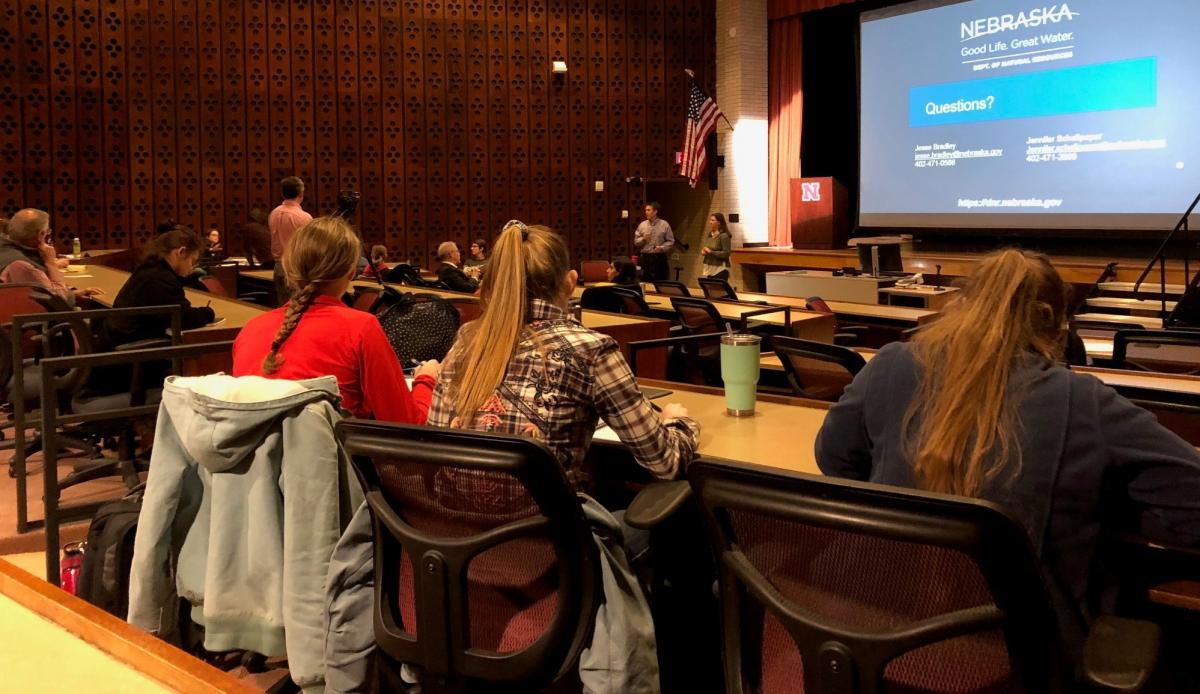
The Nebraska Water Center hosts an annual seminar series at the University of Nebraska-Lincoln to talk about Nebraska’s most precious natural resource, water. This spring, NRT students are diving into the conversation.
Jessie Johnson, master’s student in biological systems engineering, has been researching water management agencies in Nebraska while developing a decision support tool to map water recharge in irrigated landscapes. Through her research and this spring’s water seminars, she has learned how the Nebraska Department of Natural Resources and the state’s 23 Natural Resource Districts work together to manage the state’s water.
“I wish I would have attended these seminars earlier as it definitely would have expedited the learning process,” she said. “The seminars have focused on the integrated management plans used to manage the interconnected groundwater and surface water system.”
Nebraska’s 23 NRDs differ from natural resource districts in other states because they use river basins as boundaries rather than county lines. Jennifer Schellpeper, Head of the Water Planning Division of the Nebraska Department of Natural Resources said the NeDNR meets regularly with local stakeholders in the districts, maintaining transparency and engaging them in making decisions and devising plans.
“Integrated water management is proactive and adaptable,” Schellpeper said. “It’s customizable. The goals are different in different areas of the state.”
At the first seminar, January 16, she and Jesse Bradley, Assistant Director of the NeDNR, relayed the history of water management in Nebraska and its current operation. Schellpeper said partnerships, cooperation and science-based decision-making are essential tools used by NeDNR to manage water.
“NeDNR professionals gather and analyze data needed to make the best decisions concerning the use of water—water that is used for agriculture, drinking, industry, and recreation—and they work cooperatively with many organizations to ensure water is available for Nebraska’s future water needs,” she said.
She noted the importance of this to all stakeholders. “Finding a balance between competing demands is key to ensuring the future of our most precious natural resource,” she said.
Bradley said they use scientific models, applied research and data integration and visualization to inform any decisions made.
“We are going to ensure the best available science is used in decision making,” he said.
Johnson said she expects the seminars to help inform and fine-tune her master’s research project.
“I think these seminars will continue to be useful to give a better understanding of how water resources are managed in Nebraska,” she said. “I also think that these seminars will provide a good opportunity to get in contact with different NRDs or NeDNR so I can discuss my research with these agencies. I am focused on developing a software platform for them to use and getting feedback from the agencies will provide valuable information for improving the tool for them.”
Brittany Kirsch, master’s student in agronomy and horticulture, agreed. “Attending seminars series allows students to learn more about topics that interest them while providing them the opportunity to network with the speakers and other professionals in their field,” she said.
Other seminar series that NRT students are taking part in this spring are offered through the Computer Science and Engineering Department, the Department of Agronomy and Horticulture, or the School of Biological Sciences.
— Ronica Stromberg, National Research Traineeship Program Coordinator


